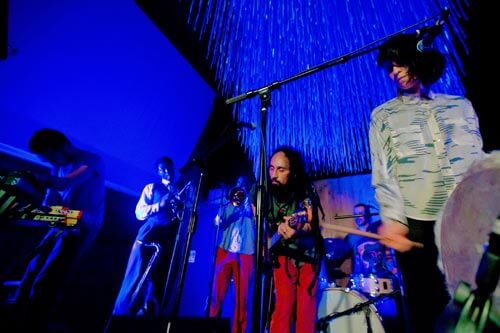Song saturated with soudade, humor, and irresistible dance rhythms are as omnipresent as ocean breezes on the Islands of Cape Verde. In April it is the destination of industry professionals and music lovers for the Atlantic Music Expo and Kriol Jazz Festival in Praia on Santiago, largest of 10 islands that make up this country. Draw a line from Europe to Brazil or Senegal to the Caribbean and you pass through the Cape Verdean Islands. Its location and historical importance in the slave trade makes it an ideally suitable environment to bring these elemental cultures together. In its music can be heard echoes of zydeco, blues, fado, and influences of zouk and kompa.
In its second year, the Atlantic Music Expo is providing a platform for these cultural exchanges. Taking place April 8-10, music professionals from both sides of the Atlantic, Africa, and Cape Verde gather. In turn the event is an opportunity for artists to showcase their music to this influential gathering. Last year 500 people, professionals and artists attended the conferences, workshops and over 20 shows over three days.
Marcy Depina says of the AME’s role “Given the very nature of how the country came into existence, its a very natural development to have the AME here. Its about opportunity, for the artist, to have this platform, particularly for African artists. Its an exciting time, another marker for Cape Verdean development.”
The Kriol Jazz festival April 10-12 begins as the Expo closes. The festival’s objective is to promote Creole music from all the islands, Caribbean, Indian Ocean, and Africa itself. Monte Alexander (Jamaica), Maya Kamaty (Reunion), Ron Savage (U.S.), Bonga (Angola), Habib Koite (Mali), Ismael Lo ( Senegal), Kenny Garrett (U.S.) join local artists Nueza, Tcheka, the Cesaria Evora Orchestra, Carlos Mendes Candida Rose, Sara Tavares and others on stage.
Sizzling funana, percussive batuca, soulful morna, coldera, samba, zouk just few of the genres popular locally. Funana pairs accordion and ferrinho (metal scraper) conversing at a lively pace. Batuque is a rhythm of resistance, beat out on laundry by women in circles during colonial era when drumming was a criminal offense. Morna is the well known slow tempo form of song and dance saturated in melancholy or soudade, a soulful wistfulness.
Nueza is an exciting young voice “singing the songs that were for adults back then, and now no one listens to now” she tells Caribbean Life prior to her U.S. debut in February. With a pretty pretty smile and direct manner, she related how she came to be here. Her father set out for the U.S. when she was four years old and was never heard from again, her mother, a singer, died of cancer when she was six, the memories of her parents are carried in the songs.
The events of her life seem to have charted fate that she sing this music, it is also a childhood dream come true, and when she sings she is recalling her parents, her childhood, her life. “Since I was I a child I always loved to sing, music was a comfort to me, music became my companion without my mom and dad. This changed with the first time she sang in public, at Frontera a Praia bar, on a dare. Soon after she met her manager Jose da Silva and her career has taken off.
Tcheka and Sara Tavares, two exciting contemporary artists performing at Kriol Jazz whose music transcends categorization. Tcheka, born into a musical family in northern Santiago has forged his place as an innovative guitarist and gifted singer/songwriter. He says, “When I create a song, it is like a sequence of images, like the frames of a film, before my eyes – the melody is itself a story I actually see in my head, and then I write the lyrics according to that vision.”
Sara Tavares, a Cape Verdean from Lisbon brings an original vision to the traditional, personal and multicultural at once, it begins with a search for identity, an issue that confronts many in her generation and she unravels in beautifully poetic songs. “I’m a very simple guitar player…” she says. “I would write my songs as lullabies. I would write little poems for myself to lift me up,” she told NPR radio at the time of her ‘Balance’ release in 2006.
As a crossroads cultural exchanges fostered by the Expo aim to be an positive force for peace through understanding. Minister of Culture Mario Lucio says, “Cabo Verde belongs to every continent.”
Other notable artists appearing at the Expo include Kuenta i Tambu (Curacao), G’Ny (Guadeloupe), Ferro Gaita (CV), M.A.K.U. Soundsystem (Columbia/U.S.), Chachi Carvalho (CV/U.S.) Mehdi Nassouli (Morocco) and Aline Frazao (Angola).

Photo by William Farringon
























